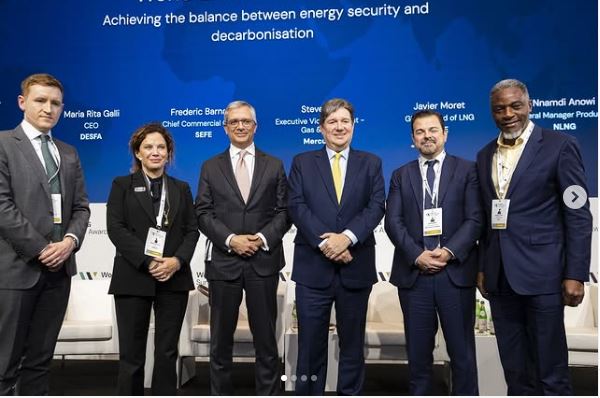BY OJO SAMSON AYOMIDE
Stakeholders in Nigeria’s oil and gas sector have urged the Federal Government to prioritise regional and continental strategies rather than focusing solely on national measures.
They made the call during an interview at the ongoing 2024 World LNG Summit and Awards in Berlin, Germany, on Thursday.
Mr Abdulmalik Halilu, the Director of Monitoring and Evaluation at the Nigerian Content Development and Monitoring Board (NCDMB), emphasised the importance of adopting an integrated approach to carbon emissions reduction.
“We must not look at net-zero goals as a stand-alone national issue.
“Instead, Nigeria should consider these regulations from the ECOWAS and African perspectives, recognising our interdependence,” he said.
Halilu also noted that regulations on emissions must operate at regional or continental levels, rather than being confined to individual countries.
“Our collective efforts are crucial, and each country should tailor its net-zero pathway to its unique circumstances, while aligning with broader regional and continental objectives.” he added.
The director highlighted the positive impact of the conference, especially in addressing issues related to decarbonisation, LNG infrastructure, and the role of renewables in reducing carbon footprints.
“The discussions around LNG, renewables, and reducing emissions have been enlightening, particularly in terms of ensuring responsible development and reducing the impact of carbon emissions,” Halilu explained.
He also touched on the importance of financial institutions in promoting responsible environmental and social practices in energy projects.
“Environmental, Social, and Governance (ESG) requirements are not intended to limit funding but to ensure that projects are developed responsibly, with care for the environment and social inclusion,” he said.
Halilu further stressed the importance of responsible hydrocarbon development, using the Ogoni cleanup incident as a cautionary example.
He encouraged the Nigerian energy sector to invest in ddecarbonisation echnologies and consider the long-term environmental impact of energy production.
“Nigeria must develop solutions that ensure low carbon intensity, especially as new LNG projects expand.
“We must invest in innovative, sustainable technologies and build local capacity to manage and maintain these solutions,” he said.
Echoing similar sentiments, Mr Olajide Bamidele, Director of Weight and Measures at the Federal Ministry of Trade and Investment, emphasised the growing importance of LNG in Nigeria’s energy future.
Bamidele noted the need to balance LNG’s dominance with the rise of alternative renewable energy sources.“We must prepare for the future by addressing challenges in LNG development and exploring new energy solutions to ensure long-term sustainability,” he said.
He said that the conference provided a valuable opportunity for Nigerian stakeholders to learn from global best practices, particularly regarding emissions reduction and energy transition strategies.
Both Halilu and Bamidele highlighted the need for Nigeria to adapt successful international policies to its own context, with a focus on creating a more sustainable energy landscape.
“As the country moves toward its 2060 net-zero target, the discussions at the summit underline the need for collaboration, innovation, and responsible development across the energy sector.
“With significant investments in LNG and upstream gas projects expected, the focus on decarbonisation and environmental responsibility remains crucial for Nigeria’s energy future,” they explained.
The five-days World LNG Summit and Awards, organised by DMG Events Ltd., attracted 750 attendees and featured 200 speakers from 500 companies across the energy value chain.

